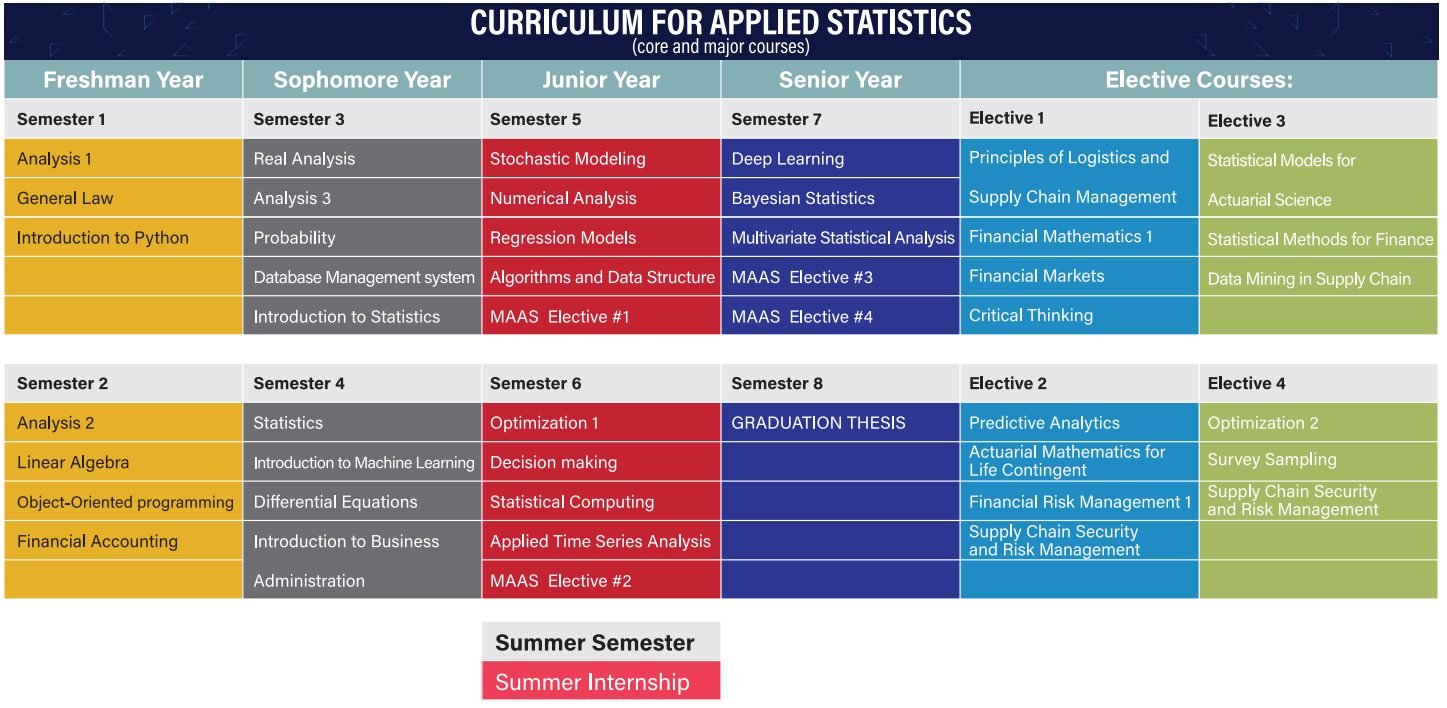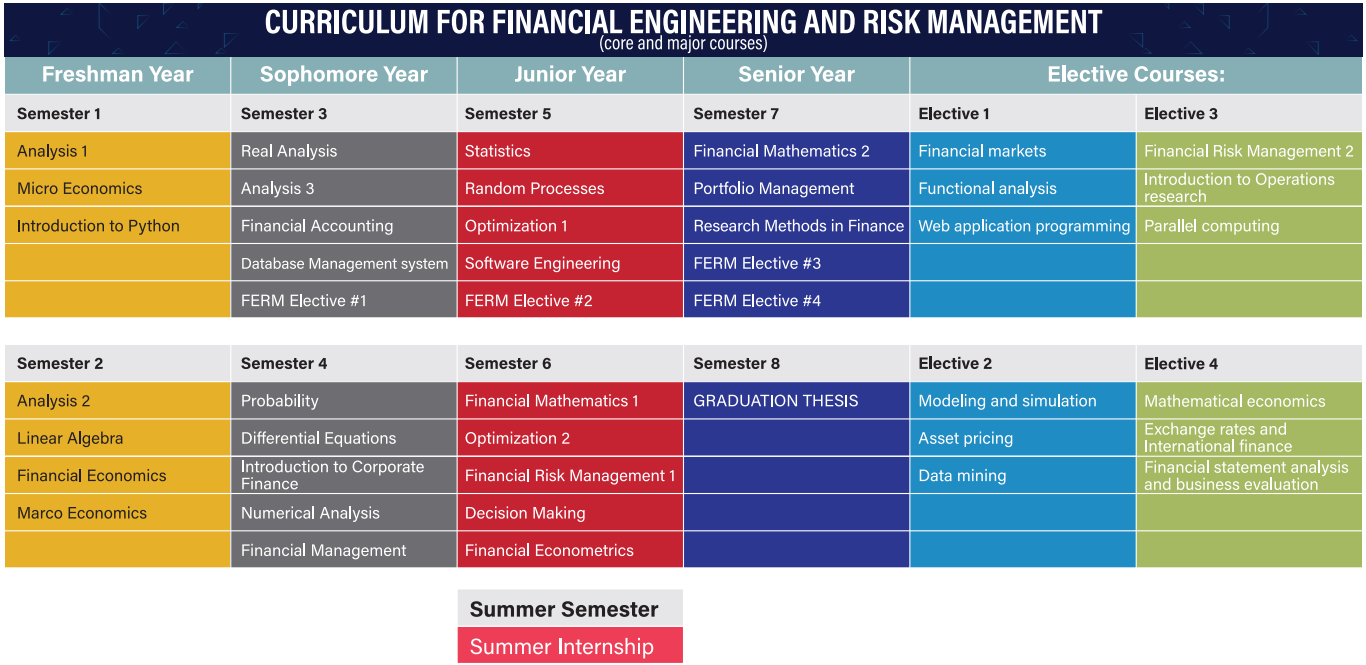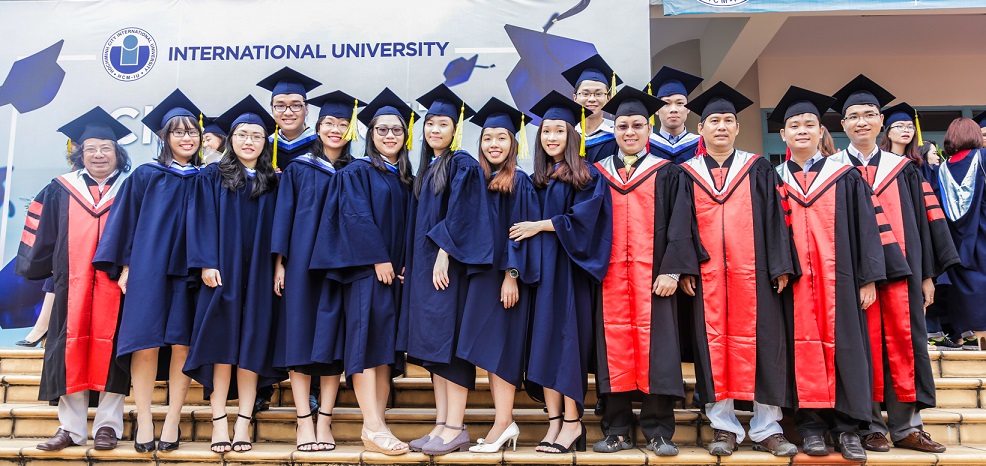The Department of Mathematics is responsible for the program of Applied Statistics and Applied Mathematics (Financial Engineering and Risk Management) at IU.
Admission plan in 2025-26: 70 students in Applied Mathematics and 40 students in Applied Statistics.
Employments Report in 2024 (survey in 2023)
I. Applied Statistics:
Registration Code: 7460201
Please click here and here for the detail information.
II. Applied Mathematics:
1. Admission Information of the program B.Sc. in Applied Mathematics (specialization in Financial Engineering and Risk Management):
1.1. Registration code – Groups of subjects
The groups of subjects are as follows:
- A00: Mathematics, Physics, Chemistry
- A01: Mathematics, Physics, English
Registration Code: 7460112
2.2. Enrollment scores
2. Scholarships
2.1. Enrollment scholarships
Enrollment scores of students who are higher or equal to the points in the table below will be considered: The number of scholarships occupies 10% for each sector (The Admissions Council considers the percentage of full and partial scholarships).
- Full scholarships:
- Free 100% for 4 years – Apply for IU programs worth about 168.000.000 VND.
- Free 100% for 2 years – Apply for Twinning programs worth about 118.000.000 VND.
- Partial Scholarships:
- Free 50% for 4 years – Apply for IU programs worth about 84.000.000 VND.
- Free 50% for 2 years – Apply for Twinning programs worth about 56.000.000 VND.
Prerequisites to maintain scholarship:
- GPA of Semester ≥ 70.
- Results of each subject ≥ 50.
2.2. Consolidated scholarships
Those who do not have the opportunity to achieve an enrollment scholarship will be considered for a consolidated scholarship each semester based on academic results.
For more admission information, please check this link.
3. Videos (in Vietnamese and English) about the Department of Mathematics and the Applied Math (FERM) program.
Graduates from the Applied Mathematics (Financial Engineering and Risk Management) program will be expected to:
- (PO1) Apply effectively their knowledge and skills as financial engineers within the industry as well as the state agencies dealing with the analysis and design of modern financial products and processes
- (PO2) Work and communicate effectively with others on multi-disciplinary teams to develop practical, technically sound, cost-effective solutions to complex financial problems
- (PO3) Maintain an active program of lifelong learning, self-updating, and continuing education while practicing financial engineering in an ethical and professionally responsible manner
- (PO4) Understand professional, ethical, legal, security, and social issues and responsibilities. Seek leadership roles as practitioners and become active members of professional and technical societies.
IV. Program Learning Outcomes (PLO or ELO)
The Expected Learning Outcomes (ELOs) of the program, also known as the program learning outcome (PLO) are formulated as below. Upon graduation, our students should be able to:
(a) Apply their modern knowledge in mathematics, modeling, and simulations in order to compute a concrete problem in finance, risk management, and related fields appropriately.
(b) Interpret the mathematical approaches and model selections for solving a specific problem in applied mathematics, finance, and risk management efficiently.
(c) Design experiments using reasoning, creative thinking, and mathematical models.
(d) Evaluate a financial product or risk management strategy to meet desired needs and constraints, such as economic, environmental, social, political, ethical, health and safety, manufacturability, and sustainability.
(e) Perform effectively on multidisciplinary teams to accomplish a common goal.
(f) Display the ability to communicate effectively with a broad range of audiences in both academic and industrial communities.
(g) Adhere to professional, ethical, legal, security, and social issues and responsibilities.
(h) Build their integrating knowledge of contemporary issues.
(i) Form a scientific worldview, logical and independent thinking to build a stable ideology and to follow the state policies.
(j) Adapt the broad educational foundation to flexibly adjust applied mathematics solutions to a specific global, economic, environmental, and societal problem in the uncertain real world.
(k) Formulate the need and continue their professional development and lifelong learning.
V. Program Specification
Curriculum map (K2020 and backward)
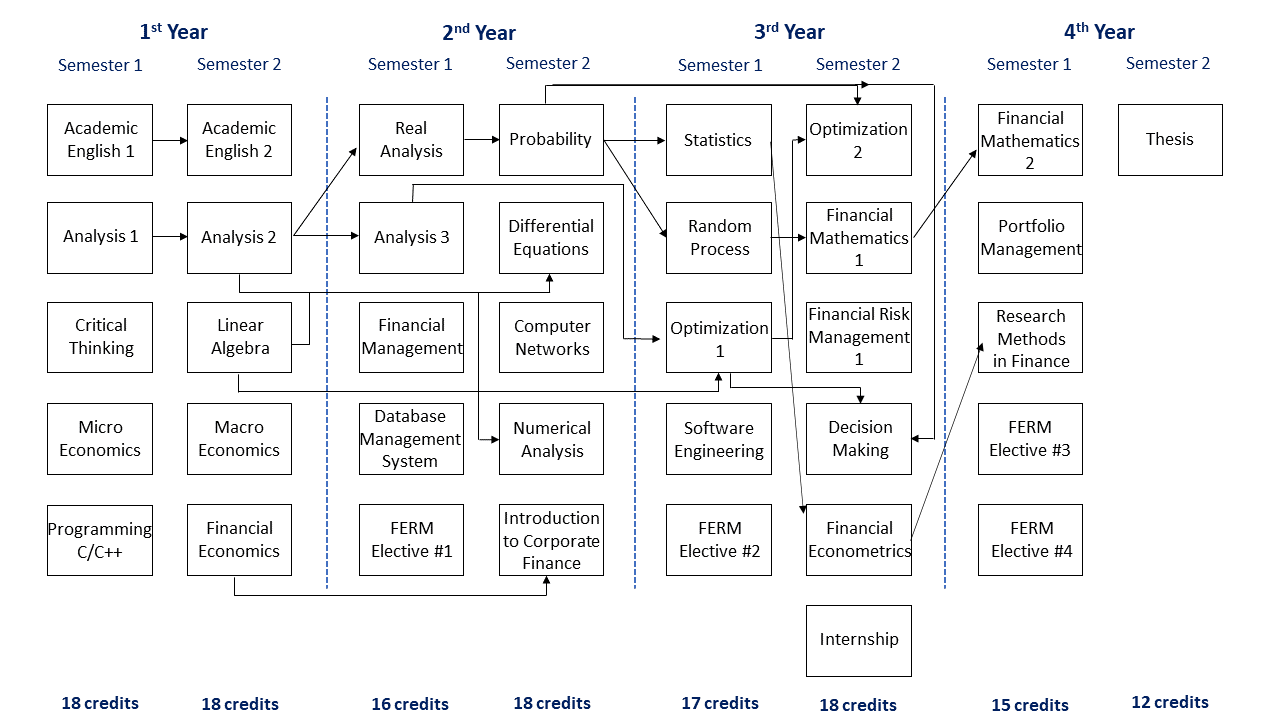
Curriculum map (from K2021 and forward)
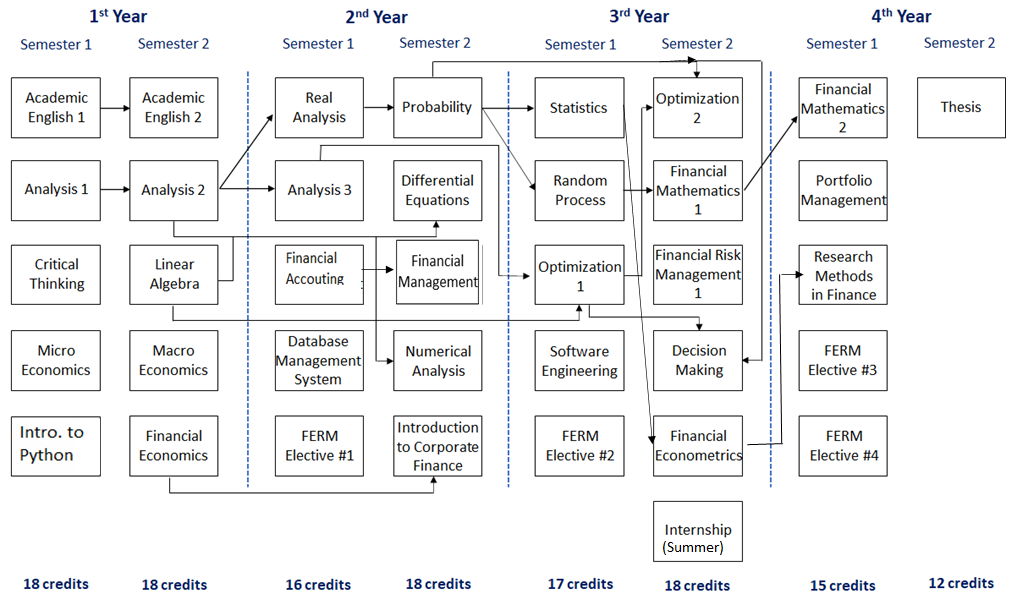
Elective courses:
FERM Elective #1: MAFE209IU- Financial markets; MAFE210IU- Functional analysis; MAFE211IU- Web application programming.
FERM Elective #2: MAFE310IU-Modeling and simulation; MAFE311IU-Asset pricing; MAFE312IU-Data mining.
FERM Elective #3: MAFE404IU-Financial Risk Management 2; MAFE411IU-Introduction to Operations research; MAFE406IU-Parallel computing.
FERM Elective #4: MAFE407IU-Mathematical economics; MAFE410IU-Exchange rates and international finance; BA306AF/BA190IU Financial statement analysis and business evaluation
VII. Teaching Philosophy:
In addition to doing research, the lecturers of the FERM program have rich experience to share their profound knowledge in applied mathematics with students and motivate them to learn and think. The Department of Mathematics has integrated the modern teaching philosophy into the program. Our program has the following educational philosophy:
(i) based on student-centered learning and constructivism
(ii) encourage and build up self-learning ability and lifelong learning capability
(iii) able to utilize information and communication technology, integration of theories, and practice
The recent educational philosophy has been announced in 2018 at a university retreat for school and department representatives. IU’s educational philosophy can be summarized as comprehensive, liberal, Pioneering, and global.
As a result, the FERM program hence can provide high-quality undergraduate education using the student-centered approach which requires students actively involve and be responsible for their own learning, while the role of academic staff is more on facilitating the learning process, providing students with updated knowledge of the field through the teaching strategies such as elaborating, concrete examples, case studies, applied research, motivating and inspiring students for self-studying.
VIII. List of some outstanding alumni:
https://math.hcmiu.edu.vn/alumni/
Contact:
E-mail: bthuong@hcmiu.edu.vn
Fax: (84-28) 37244271
Tel: (84) (28) 37244270 ext. 3235
